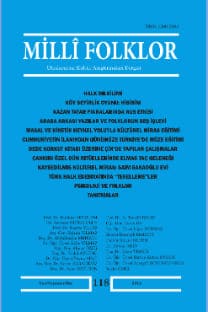Dede Korkut Kitabı ve Beowulf Destanlarına Ekoeleştirel Bir Yaklaşım
AN ECOCRITICAL APPROACH TO THE BOOK OF DEDE KORKUT AND BEOWULF
___
- Andrew, Malcolm (ed.). Two Early Renaissance Bird Poems. Cranbury: Associated University Press, 1984.
- Bernheimer, Charles. “Introduction: The Anxieties of Comparison.” Comparative Literature in the Age of Mul ticulturalism. Baltimore and London: The John Hopkins University Press, 1995. 1-21.
- Bunting, Ben. “Nature as Ecology: Toward a More Constructive Ecocriticism.” The Journal of Ecocriticism. 7.1 (Summer 2015): 1-16. C hase, Colin. The Dating of Beowulf. Toronto: University of Toronto Press, 1997.
- Clanchy, M. T. From Memory to Written Record: England 1066-1307. West Sussex: Wiley-Blackwell, 2013.
- Cohen, Jeffrey Jerome. Hybridity, Identity, and Monstrosity in Medieval Britain: On Difficult Middles. New York: Palgrave Macmillan, 2006.
- DuBartell, Deborah. “The Anglo-Saxon Sea and the Semantics of Space.” SKY Journal of Linguistics. 31 (2018): 7-34.
- Ekici, Metin. “13. Dede Korkut Destanı: ‘Salur Kazan’ın Yedi Başlı Ejderhayı Öldürmesi’ Boyunu Beyan Eder Hanım Hey!” Millî Folklor. 122 (Summer 2019): 5-13.
- Estes, Heide. Anglo-Saxons Literary Landscapes: Ecotheory and the Environmental Imagination. Amsterdam: Amsterdam UP, 2017.
- Erdoğan, Hilal. “Relationships between Nature, Human and Space in The Book of Dede Korkut.” Unpublished M.A. thesis. Ankara: Gazi Uni., 2014.
- Glotfelty, Cheryll and Harold Fromm (eds.). The Ecocriticism Reader: Landmarks in Literary Ecology. Athens, Georgia and London: The University of Georgia Press, 1996.
- Greene, Roland. “Preface.” Tales of Crossed Destinies: The Modern Turkish Novel in a Comparative Context. Azade Seyhan. New York: MLA (2008): vii.
- Higham, Nicholas J. and Ryan, Martin J. (eds.). The Landscape Archaeology of Anglo-Saxon England. Wood bridge: The Boydell Press, 2010.
- Hudson, Mark (trans.). Beowulf. London: Wordsworth Classics of World Literature, 2007.
- Huggan, Graham and Tiffin, Helen (eds.). Postcolonial Ecocriticism. New York: Routledge, 2010.
- Korkmaz, Ramazan. “Dede Korkut Hikâyelerindeki Su Kültünün Mitik Yorumu.” Türk Kültürü. XXXVI, 418 (1998): 91-98.
- Lechmann, Cortney Nicole. “Water, Prestige, and Christianity: An Ecocritical Look at Medieval Literature.” Unpublished M.A. thesis. Las Vegas: University of Nevada Las Vegas, 2016. https://digitalscholar ship.unlv.edu/thesesdissertations/2696.
- Lewis, Geoffrey (trans.). The Book of Dede Korkut. Harmondsworth: Penguin Books, 1974.
- Magoun, Francis Peabody. “The Theme of the Beasts of Battle in Anglo-Saxon Poetry.” Neuphilologische Mit teilungen. 56 (1955): 81-90.
- Meeker, Joseph W. The Comedy of Survival: Studies in Literary Ecology. New York: Charles Scribner’s Sons, 1972.
- Meeker, Michael M. “The Dede Korkut Ethic.” International Journal of Middle East Studies. 24. 3 (1992): 395- 417.
- Michelet, Fabienne L. Creation, Migration, and Conquest. Oxford: OUP, 2006.
- Niles, John. “Pagan Survivals and Popular Beliefs.” The Cambridge Companion to Old English Literature, (ed.)
- M. Godden & M. Lapidge, 2nd edn. Cambridge: Cambridge Univ. Press (2013): 120-36.
- Oppermann, Serpil. “Theorizing Ecocriticism: Toward a Postmodern Ecocritical Practice.” Interdisciplinary Studies in Literature and Environment. 13.2 (2006): 103-128. _____ . “Conclusion: A Roundtable Discussion on Ecocriticism.” The Future of Ecocriticism: New Horizons, (eds.) Serpil Opperman, Ufuk Özdağ, Nevin Özkan, and Scott Slovic. Newcastle upon Tyne: Cambridge Scholars Publishing (2011): 459-480.
- Radhakrishnan, R. “Why Compare?” New Literary History. 40.3 (Summer 2009): 453-471.
- Rueckert, William. “Literature and Ecology: An Experiment in Ecocriticism.” The Ecocriticism Reader: Land marks in Literary Ecology. Athens, Georgia and London: The University of Georgia Press (1996):105-123.
- Slovic, Scott. “Conclusion: A Roundtable Discussion on Ecocriticism.” The Future of Ecocriticism: New Hori zons, (eds.) Serpil Opperman, Ufuk Özdağ, Nevin Özkan, and Scott Slovic. Newcastle upon Tyne: Cam bridge Scholars Publishing (2011): 459-480.
- Sümer, Faruk, et al. “Introduction.” The Book of Dede Korkut: A Turkish Epic. Texas: University of Texas Press (1972): ix-xxiii.
- Wilt, Brian David. “Geofon Deaðe Hweop: Poetic Sea Imagery as Anglo-Saxon Cultural Archetype.” Un published M.A. thesis. Kirksville, Missouri: Truman State, 2014. https://pqdto pen.proquest.com/doc/1615129886.html?FMT=AI.
- Zapf, Hubert. “The state of ecocriticism and the function of literature as cultural ecology.” Nature In Literary and Cultural Studies: Transatlantic Conversations on Ecocriticism. (eds.) Catrin Gersdorf and Sylvia Mayer. Amsterdam - New York, NY: Rodopi (2006): 136-147.
- ISSN: 1300-3984
- Yayın Aralığı: 4
- Başlangıç: 1989
- Yayıncı: Geleneksel Yayıncılık Eğitim San. Tic. Ltd. Şti.
ALEVİ TÜRKMENLERDE BİR HALK OYUNU: “CANİMEN” -ANKARA KALECİK YÖRESİ ÖRNEĞİ-
Hayati BEŞİRLİ, Emel YİĞİTTÜRK EKİYOR
KENT VE İMGE: TELEVİZYON DİZİLERİNDE GAZİANTEP SİMÜLASYONU
TEBRİZLİ İRAN TÜRKLERİNDE MASAL ANLATICISI TİPOLOJİSİ VE KÜLTÜREL KİMLİK
DELİ VE DELİLİK TEMALI ANLATMALARIN BAĞLAMSAL ÇERÇEVESİ -DENİZLİ ÖRNEKLEMİ-
Mustafa ARSLAN, Didem Gülçin ERDEM
Özlem KEVSEROĞLU, Hatice AYATAÇ, Nilüfer BATURAYOĞLU YÖNEY
HALK RESMİNDEN GRAFİK TASARIMA: NUMAN BALICA VE ADAPAZARI’NDA YETİŞTİRDİKLERİ
TÜRK HALKLARININ ŞECERECİLİK GELENEĞİ YA DA MİLLÎ BELLEK
Saltakova Zhanat TOKTARKYZY, Naci ÖNAL
EVLİYA ÇELEBİ SEYAHATNAMESİ ÇERÇEVESİNDE MISIR’DA KAHVE VE KAHVEHANE KÜLTÜRÜ
Nurulhude BAYKAL, Suna TİMUR AĞILDERE
HAC ANLATILARINDA YABANCI İMAJI
Dede Korkut Kitabı ve Beowulf Destanlarına Ekoeleştirel Bir Yaklaşım
